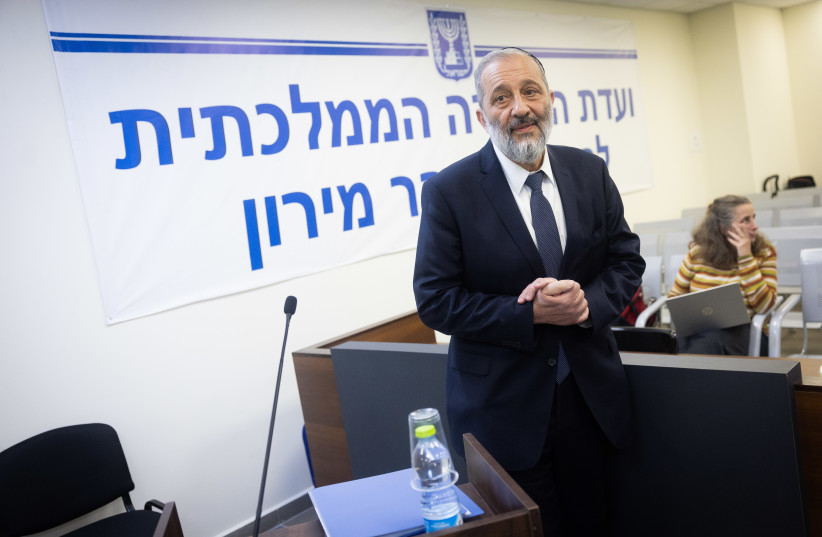The Mount Meron Disaster Inquiry on Wednesday set December 13 as a key hearing date where a range of officials, including prime minister-designate Benjamin Netanyahu, will have the opportunity to respond to the warnings they were issued in August.
In August, the state inquiry issued its first official letters of warning of negligence or legal wrongdoing placing the blame on Netanyahu, former public security minister Amir Ohana, Israel Police Chief Kobi Shabtai, former religious services minister Yaakov Avitan and several other police, government and safety officials.
Much of the approximately 18-month inquiry has revolved around failures by the engineers, religious affairs and police officials involved to ensure that the structures around Meron were safe and the site was not overwhelmed.
But the inquiry has also questioned top political officials, all of whom had been holding their breath about whether the inquiry would place the blame on them during an election season for the Mount Meron disaster on Lag Ba’omer in 2021 when 45 people were trampled to death.
Notably, former interior minister Arye Deri was not given a warning.

Benjamin Netanyahu's testimony about Meron
"I cannot take responsibility for something I did not know," Netanyahu had told the state-appointed commission of inquiry in late July, adding that his responsibility pertained to the epidemiological consequences of holding the festival during the height of a COVID-19 outbreak.
In his testimony, Netanyahu said that he "knew hundreds of thousands - 400,000 or 300,000 - I do not remember exactly, people came to Meron. I knew there was ongoing supervision as determined by a government decision." He added that he "did not know there was a critical safety issue. I heard about overcrowding, but do not think we knew there was a safety issue."
He deflected questions about how he could be prime minister for 12 years and not be responsible, saying he had still tried to improve on the relevant issues more than prior prime ministers.
Rejecting allegations that he was pressured to ignore safety issues by his Haredi political partners, he noted that he had shut down Meron during spring 2020 due to the coronavirus crisis.
In August, the inquiry said that these answers might not be satisfactory due to the length of time Netanyahu served as the country's premier and the number of comptroller and other government reports his office had received warning of disaster.
Netanyahu appears ready to form the next government having won the election and the next question is whether his government will intervene in the commission’s work.
A number of police officials and other officials involved with the site have said that they were heavily pressured by the political echelon, including Deri and Ohana, to ignore any related safety issues in order to facilitate the maximum number of attendees in this narrative.
The politicians themselves were under pressure to maximize the number of attendees in 2021 given that the coronavirus had led to completely canceling the event in 2020.
Ohana has said that he was concerned when he saw the status of the structures on the mountain, but that he was told that the structures had all of the appropriate sign-offs from relevant safety officials.
However, the committee said that he did not take the danger seriously enough or ask enough questions of those he had responsibility for who could have saved lives.
Regarding Shabtai, the inquiry said that his planning was too reactionary and not sufficiently preventative, depending too much on spotting and coping with issues on the fly.
Lawyers Eliram Bekel and Oded Gazit, representing Shabtai, responded by saying that his being warned did not mean that the inquiry would make a final negative finding against him.
Shabtai also made a statement that he had no intention of resigning.
On April 11, Shabtai attempted to shift responsibility for the tragedy onto the head of the police’s Northern District, Asst.-Ch. Shimon Lavi, as well as on former police operations commander Amnon Alkalay, who is a fierce critic of Shabtai.
Alkalay said that despite senior police officers’ recommendation to restrict the crowd at each bonfire, Shabtai had outright rejected it.
“[Shabtai] said: ‘Either the mountain is completely open or closed,’” Alkalay said. “I warned them to prepare for a multi-casualty incident.” He added that during the preparatory meeting for the incident, “the chief said: ‘If there is a commission of inquiry, you can put it on me.’”
Shabtai rejected Alkalay’s testimony.
Lavi and several other police officials were also warned by the inquiry.
Rabbi Shmuel Rabinowitz, who manages the Western Wall and other holy sites, was also sent a warning letter, though he placed blame on an extremist Hasidic sect.
Observers have credited the committees’ two rounds of interim recommendations with facilitating a safer Lag Ba’omer this past May and potentially assisting next year’s celebrations.
Eliav Breuer contributed to this report.
